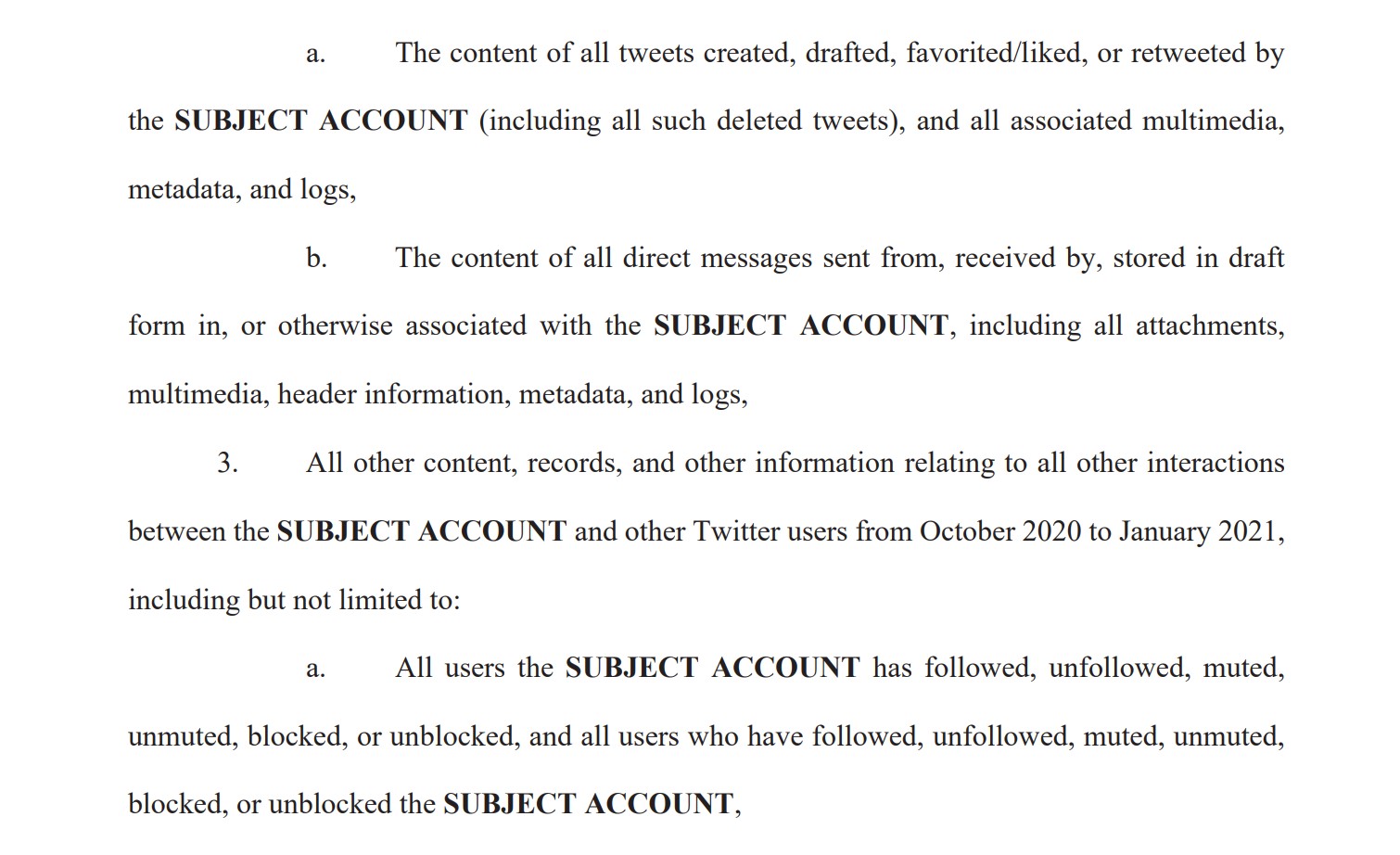Attorneys for the Justice Department have revealed documents connected to their search warrant for Donald Trump’s Twitter account, indicating that prosecutors collected a massive collection of data about the former President’s social media activity—including information on every account that liked, followed, or retweeted him.
The extensively redacted search warrant was revealed as a result of a judge’s ruling on November 17, which came after a consortium of media organizations filed an application in August for the warrant and other data to be made public.


Twitter appears to have provided the DOJ with vast volumes of material under compulsion.
Indeed, Special Counsel Jack Smith sought, and appears to have gotten, information on all users Trump followed, unfollowed, muted, unmuted, blocked, or unblocked, as well as all users who followed, unfollowed, muted, unmuted, blocked, or unblocked Trump.
Smith also requested that Twitter provide information on “all lists of Twitter users who have favorited or retweeted tweets posted by [Trump], as well as all tweets that include the username associated with the account (i.e., ‘mentions’ or ‘replies’).”
The DOJ’s request also wanted information on Trump’s geolocation, private messages, search history, and contact information. More outrageously, prosecutors allegedly wanted to know his pronouns, as reported by Headline USA in August, when court transcripts relating to the Twitter-DOJ battle became available.
The warrant’s release comes after Twitter objected to the search warrant as well as an accompanying gag order, claiming that the gag order violated the company’s First Amendment right to communicate with Trump and that Trump may have legal standing to use executive privilege to block the warrant.
Twitter’s challenge to the DOJ was eventually unsuccessful, with Obama-appointed District Judge Beryl Howell fining the firm $350,000 in February for failing to fulfill a deadline for complying with the order.
All of Howell’s rulings were upheld by an appeals court.
Justice Department attorneys have since released records related to their search warrant for Donald Trump’s Twitter account, revealing that prosecutors obtained a vast trove of data about the former President’s social media activity—including info on every account to like, follow or retweet him.
The heavily redacted search warrant was released Monday pursuant to a Nov. 17 judge’s order, which was made after a coalition of media groups filed an application in August for the warrant and other records to be made public.
From the looks of it, Twitter forked over massive amounts of information to the DOJ.
Indeed, Special Counsel Jack Smith sought, and apparently ultimately received, all users Trump followed, unfollowed, muted, unmuted, blocked, or unblocked—as well as all users who have followed, unfollowed, muted, unmuted, blocked or unblocked Trump.
Additionally, Smith demanded Twitter data on “all lists of Twitter users who have favorited or retweeted tweets posted by [Trump], as well as all tweets that include the username associated with the account (i.e., ‘mentions’ or ‘replies’).”
The DOJ’s warrant sought a slew of other data as well—including information on Trump’s geolocation, his private messages, search history and contact info. More absurdly, prosecutors apparently wanted to know his pronouns—as Headline USA reported in August, when court transcripts related to the Twitter-DOJ dispute were made public.
The release of the warrant follows Twitter opposing the search warrant as well as an accompanying gag order—arguing that the gag order violated the company’s First Amendment right to communicate with Trump, and that Trump may have legal standing to raise his executive-privilege rights to block the warrant.
Twitter was ultimately unsuccessful in its opposition to the DOJ, with Obama-appointed District Judge Beryl Howell also fining the company $350,000 in February for failing to meet a deadline for complying with the warrant.
An appeals court upheld all of Howell’s decisions.
“In sum, we affirm the district court’s rulings in all respects. The district court properly rejected Twitter’s First Amendment challenge to the nondisclosure order,” the appeals court said in a decision unsealed in August.
“Moreover, the district court acted within the bounds of its discretion to manage its docket when it declined to stay its enforcement of the warrant while the First Amendment claim was litigated,” the court added.
“Finally, the district court followed the appropriate procedures before finding Twitter in contempt of court—including giving Twitter an opportunity to be heard and a chance to purge its contempt to avoid sanctions. Under the circumstances, the court did not abuse its discretion when it ultimately held Twitter in contempt and imposed a $350,000 sanction.”
As reported by Politico, Twitter’s dispute with Smith’s team stemmed from prosecutors’ decision to serve the warrant alongside a “nondisclosure order” that barred Twitter from informing Trump — or anyone else — of the warrant’s existence.
“Based on ex parte affidavits, the district court found probable cause to search the Twitter account for evidence of criminal offenses. Moreover, the district court found that there were ‘reasonable grounds to believe’ that disclosing the warrant to former President Trump ‘would seriously jeopardize the ongoing investigation’ by giving him ‘an opportunity to destroy evidence, change patterns of behavior, [or] notify confederates,’” the appeals court noted.
This is chilling: Not only did Jack Smith seek to violate Donald Trump’s reasonable expectation of privacy in search for a crime, he wanted to do it in secret.
Furthermore, Smith’s team sought to investigate everyone who interacted with Trump’s account on Twitter/X, as if they were implicated in a criminal racketeering enterprise.
The Justice Department has now devolved into a weapon for political partisans, rather than being an instrument of law enforcement.
NOW READ:
Border Patrol Agents are ‘Virtually’ Processing Migrants As They Surge Across Southern Border






